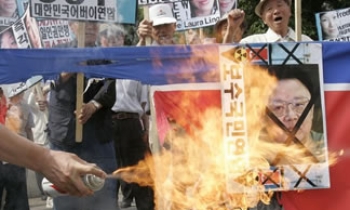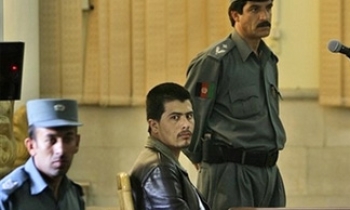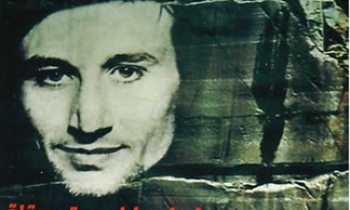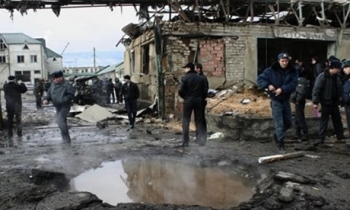DUBAI, United Arab Emirates: From the clusters of plasma screens that adorn the red-tinted walls of al-Arabiya, one of the Arab world's most influential news channels, the battles of the Middle East aired on an hourly bulletin: more carnage in Iraq and a standoff over Iran's nuclear program. At the small, cluttered desk of Nabil Khatib, another struggle, perhaps no less important, was underway.
Khatib leaned toward the story of a reporter, who was standing next to him. He stared blankly at the computer screen, then fell back. He paused, then reached for his keyboard, quickly deleting a sentence. The line in question: "Iraqis are still paying the price with their souls" for the U.S.-led invasion and its avowed democratic aim.
He shook his head -- a rare departure from a funereal bearing that seems intended to discourage argument.
"You're speaking as a citizen," Khatib admonished the reporter, "not as a journalist."
The reporter nodded, a gesture that suggested acquiescence and disapproval.
A 15-year veteran of reporting in the Middle East, Khatib is the executive editor of al-Arabiya, a position that thrusts him into a maelstrom of the most powerful forces in the Arab world today: crusading media and their editorial perspectives, the power of Persian Gulf money and the political loyalties it demands, thin-skinned potentates and the religious currents that buffet them, decades-long traditions in submissive Arab journalism and vociferous critics who dismiss his station as a lackey of the Americans and Saudi Arabia.
From his isolated perch, cluttered with two dozen videotapes, he has plunged into the fray in an attempt to change his station's coverage of the Arab world by breaking the traditions that long defined it. The battle is not simply over a station's identity; the goal, he insists, is to transform the Middle East.
"Who can do this?" Khatib said. "Only media. Give me the information and give me a chance to make conclusions myself. Let me decide." His cellphone rang, and his desk phone. Staff passed by with questions. Behind him was a window on Dubai, the oil boom equivalent of a gold rush town. "We are trying to redefine the news," he said.
His vision is to connect with his viewers in a different way than his colleagues have in the past, wedded as they were to a government-dictated agenda and an aversion to probing society's ills. He seeks to create the television equivalent of a front page that would forgo banner headlines on Iraq or the Israeli-Palestinian conflict for the more pressing issues he believes face Arab viewers -- their health, education, livelihoods, the questions any citizen might ask of leaders held accountable. First, though, he wants coverage that, in his view, is balanced, a word that itself gives way to endless interpretations.
On its billboards across the Arab world, al-Arabiya boasts: "With us, you are closer to the truth." But truth can be relative, shaped by perspective. In few other places do the rules of journalism feel so fluid, so competitive, with the stakes so high. And never in the history of Arab media have two channels -- al-Arabiya and al-Jazeera, based in Qatar -- had so much influence and leeway in determining the very definition of news and, by default, the priorities of their viewers.
These channels "are more dangerous than nuclear bombs, and they radiate on a large scale," said Abdul Rahman al-Rashed, the station's general manager. "It could push them to go into a war, or it could make the people believe in peace and change their lives. It is exactly what we're in charge of today."
With a staff of 330, al-Arabiya broadcasts around-the-clock to tens of millions of viewers across four time zones. It was established in 2003 by the Middle East Broadcasting Co., a Saudi-owned media conglomerate that is one of the largest in the Arab world. From the start, its owners called al-Arabiya a more sober alternative to al-Jazeera, whose offices were bombed by the U.S. military in Iraq and Afghanistan (by mistake, the Pentagon said; al-Jazeera insists otherwise). Al-Jazeera, with more staff and money, remains its biggest competition, even though others have emerged: the less-watched, U.S.-funded al-Hurra, Iran's al-Alam and, in planning, a BBC Arabic station, along with French and Russian channels.
To set it apart, al-Arabiya has struck a new look in news and programming. It has embraced business news and introduced a morning show, "al-Arabiya Morning," modeled on American broadcasts and long on arts, fashion and movies. It portrays itself as the region's CNN, in contrast to al-Jazeera's Fox News. Its operation is younger and sleeker than that of al-Jazeera, which remains at times quicker and harder-edge.
Al-Arabiya's critics, including some in its own newsroom, say style has come to subsume substance -- that redefining news has made it too timid and overly beholden to pressure from its Saudi benefactors.
"You don't watch a news channel to see fluff," said Muhannad Khatib, a senior anchor who left al-Arabiya after he said its management tried to force a politicized, pro-Saudi agenda into his news show. Khatib, who is not related to the executive editor, said he watches at least two al-Jazeera news bulletins a day. "I feel I'm not satisfied when I watch al-Arabiya. Something is missing."
Khatib, the executive editor, dismissed the talk. "It will take time," he said.
Silence followed, as if he were reassuring himself.
'Real Answers' to 'Real Questions'
Khatib is a big man who strides with a lumbering gait, shoulders slumped, through the ultramodern newsroom of al-Arabiya. Fluorescent lights run the length of glass columns, and banks of televisions give the room a frenetic feeling. At the edge of his cubicle -- modest, given his position -- is a screen broadcasting al-Jazeera.
Like many colleagues, he speaks with respect for al-Jazeera, founded in 1996. It broke taboos, he said -- angering nearly every Arab state and drawing a fervent following with its professional bulletins and freewheeling talk shows.
"But," he said, "that's not the issue anymore."
Khatib took a seat at his computer, editing the upcoming bulletins. He talked about the stories behind each headline: Iraq, Iran and, then, in an unusual choice of words, "the Palestinian territories." Rarely is that phrase heard in the region. It's usually Palestine, a word that can convey a sense of territory as well as justice. But Khatib, a Palestinian, seemed to be making a statement: that his phrase was less ideological, and that he wanted to avoid ideology as an editor.
"For 50 years, all Arabs have heard about is Israelis, Palestinians, Americans, Arab summits and so on, and nothing about real answers to the real questions of why he is poor, frustrated and unhappy with the level of health care and education for his kids," Khatib said. "These are the concerns of any human being and any Arab. But if you ask someone what he is concerned about most, he will tell you Jerusalem or Iraq, because you keep telling him this."
To him, the task is engaging viewers and bringing them different stories, far from traditional politics. He ticks off a wish list: more human interest pieces about, say, a solar eclipse or someone who lost 80 pounds. He wants reporters to get people to talk about sensitive issues rarely discussed in a socially conservative Arab world: drug abuse, prostitution and gay rights. What about victims of the avian flu, as a way of exploring health risks? He pursued that in Egypt in March, he said, but when his Cairo bureau chief tried to interview someone infected, authorities stonewalled. Two days passed without permission to visit the hospital in the Nile delta.
Approval arrived, he said, after the victim had recovered. It was no longer a story.
"We are inventing the basic tradition of being sensitive to the public interest," he said, "and we need to fight for it."
Khatib marks the beginning of his career as a journalist on Sept. 26, 1978. He was arrested by Israeli troops in Nablus as he walked home from a Bruce Lee movie with two friends. "You're an agitator," Khatib recalled the Israeli interrogator telling him.
After his release weeks later, his older brother, a student at Birzeit University, visited him at home in Nablus.
"What's agitation?" Khatib hurried to ask him.
"It's a kind of journalism," his brother said.
"I thought, well, if that's journalism, maybe I should become a reporter," Khatib said.
In 1980, Khatib left for the Soviet Union on a scholarship, studying "socialist journalism" at the Belarusan State University in Minsk. Israel invaded Lebanon in 1982, and Khatib -- as he recalls, at 19, "enthusiastic and revolutionary" -- decided to fight with the Palestinian forces. He never made it to a besieged Beirut, where two friends were killed. He was instead stranded in Lebanon's Bekaa Valley -- far from the battle, with no training or support and a lot of time for introspection.
"I thought, why am I here?" he said. He came to doubt politics and its manipulations. "As a politician, you need to use people, and I don't like to be used and I don't like to use people. This is a game being played all over the world, and I just don't like it, and I don't want to be part of it."
The experience left him reticent about righteous claims to certainty. "Since then," he said, "the only thing I feel strongly about is that I shouldn't feel strongly about what is right and wrong."
He eventually returned to the West Bank, where he was hired as a correspondent by the Middle East Broadcasting Co. He became bureau chief, splitting his time teaching journalism at Birzeit University. In 2004, he was brought to al-Arabiya.
As he smoked in the stairwell, he thought back to what he knew two decades ago and what he feels now.
"I still have the same passion, but it's directed in a different way," he said. "It's not the same idea, it's about being fair."
Theory vs. Practice
Khatib and Rashed speak in similar terms: a disillusionment with what they see as past deceptions, an ideological orthodoxy that squelched dissent. They evince a determination to bring to al-Arabiya what they call balance and fairness, with a savvier notion of what their audience wants. Business coverage, for instance, has helped al-Arabiya become most popular in the lucrative Saudi market, although al-Jazeera says it maintains a commanding lead across the region.
As for news, Rashed, a former editor of Asharq al-Awsat, an influential Saudi-owned daily newspaper, said it is not his job to defend what he called the cause, an Arab nationalist perspective that he said colored the way news traditionally had been framed.
"What is supposed to be the accepted truth, I just don't think is accepted by me," he said.
Rashed is blunt. He accuses Arab journalists of "conspiring not to tell the truth" in their coverage of Iraq, particularly by inflating civilian casualties in U.S. bombings. He points with pride to al-Arabiya's decision to no longer air the anonymous tapes of Iraqi insurgents, believing they gave groups of questionable credibility an unwarranted platform.
But some staff members will say there is sometimes an al-Arabiya in theory, Rashed and Khatib's vision of a new style of Arab news, and an al-Arabiya in practice, where those ideals get muddied. In moments, editorial decisions can become political crises, from Morocco to Iran, and editors at times have decided not to air promotions for news shows to avoid a feared backlash from Arab leaders. Reporters say stories have been killed or pulled after generating too much criticism. In the newsroom, workers whisper about strained relations between King Abdullah of Saudi Arabia and the parent company, MBC, which is owned by Walid al-Ibrahim, a brother-in-law of King Fahd, Abdullah's predecessor.
Words like balance and fairness are seen by some as coded language for avoiding controversy; almost everyone talks about self-censorship, even if they contend that is different only in degrees from what their Western colleagues face.
"You come under pressure almost every day," said Mohammed Abdel-Raouf, an Egyptian producer.
On the television behind him, the al-Arabiya news bulletin led with a speech by the Saudi monarch promising gradual political reform by the world's largest oil exporter without violating Islamic principles. Despite breaking news from Iraq and the Gaza Strip, it stayed the top story through the day.
"It is important," he said, "but suppose we have another story? It will still remain our first headline."
Abdel-Raouf, a veteran of the state-controlled Egyptian Gazette, ticks off other subjects: minimal coverage by al-Arabiya of the demonstrations over the cartoons of the prophet Muhammad in a Danish newspaper; less attention to the Israeli-Palestinian conflict, which he says editors think has begun to bore viewers; 72 hours straight on King Fahd's death last summer, coverage so intense that some on the al-Arabiya staff said they started watching al-Jazeera. Even on breaking stories, the broadcast will routinely cut to business news, "telling viewers this is more important than the news story."
"It is a political point of view, not a news point of view," Abdel-Raouf said. "You don't have to ask about the guidelines because you know what they are. When you hear it once, twice, three times, you don't need anyone to remind you."
Rashed acknowledged that he faced Saudi pressure, "to an annoying degree," although he says it comes from other governments as well, along with an Arab intelligentsia he finds reactionary. In past months, the station has quit covering a former Syrian vice president who defected in Europe. In a huge scoop, it had aired an interview with him in December, where he blamed Syria for the assassination of a former Lebanese prime minister. Veiled threats followed from Syria, and the station brought its Beirut correspondent to Dubai for more than a month, fearing for his safety. Rashed said the threats were part of the decision to stop covering the exiled official.
"I am calculating my risk," he said. But he acknowledged, too, that Saudi officials had ordered him to back off.
The Nuts and Bolts of News
On Khatib's desk is a statuette of the god of work, brought by a colleague from Cambodia. It has eight arms, each with a tool -- a saw, hammer, pliers and so on. "If you had eight arms and 40 hours instead of 24," he said, "that would be an interesting life."
Khatib says he leaves to Rashed the newsroom's high politics -- relations with management and Saudi officials -- in part because he's too busy to do otherwise in a workday that often stretches from 9:30 a.m. to 11 p.m., overseeing 34 bureaus. On this day, it was 6 p.m., one of his three crunch times, ahead of the competitive evening news.
In a span of a few minutes, someone asked for his help on accreditation to the World Economic Forum. A text message beeped on his cellphone, one of perhaps 100 he received that day. He ignored e-mail; 500 were unread. "I look at it, and I get scared," he said. On his screen, al-Jazeera broadcast news of three Marines killed in western Iraq; al-Arabiya left it for the next bulletin.
His cellphone rang. "When did he die?" he said, standing up.
Heads in the newsroom turned. "Who died?" asked a producer, Hanadi el-Imam.
It was Mohammed al-Maghout, a Syrian poet and writer. Khatib reluctantly opened his e-mail and sent a request for archival footage. He then greeted the sister of a colleague slain in Iraq, one of 11 al-Arabiya staff members to die there.
A moment later, and he turned to edit a story for the late-night news show, "The Last Hour."
It was the four-paragraph script on the political deadlock in Iraq over the nomination of Prime Minister Ibrahim al-Jafari. He cut a line: "considering that Jafari is not favored by Washington." Too subjective. He changed the word "inflexibility" of the parties' positions to "their inability to reach a framework." He debated a line about U.S. pressure on Jafari. Again, too subjective.
"What if we put 'observers say' there?" said the Iraqi writer, Diyar Omari, a former al-Jazeera bureau chief in Baghdad.
"No," Khatib said, shaking his head. "That's a game that you know I know."
Khatib seems to relish those exchanges, the way for him to agitate toward instilling what he views as fairness.
At the news meeting the next day, he debated running a story on Iran that would look at its geopolitical ambitions in the region. The producer, Imam, asked whether to invite an Iranian or American guest. Khatib grimaced -- the premise of the story itself was controversial.
"If you put on an American, it will look like you're campaigning against Iran," he said. "If you put on an Iranian, it will look like propaganda for Iran." To be correct, he said, you would need to have two opinions.
"So what do you suggest?" she said.
"Drop it today," he answered. The story was left for another day.
'It's a Daily Fight'
Khatib almost always stays unruffled, perhaps self-consciously, giving his decisions a passionless feel. But his demeanor belies a frustration with his correspondents' lack of freedom and the prevailing notion of what journalism is.
He scans the day's report for an example of what he wants the reporting to become.
"Most of these are about Iraq, Pakistan, Iran and the Palestinians," he said, frowning, as he scrolled item to item.
The next day he did it again, and the answer was the same. It is theory and practice, again.
"It's a daily fight," he said. "You worry about content, about being fair, the competition, being accurate, being good in the eyes of viewers, being good in the eyes of management, the views of colleagues. It needs a magic formula that I haven't found, yet." He thought he needed three months to impose his vision. "Now it's 18 months, and I don't know how long it will take."
He ordered another cup of coffee. At his wife's request, he had gone home early the night before, at 9 p.m., then ended up staying on the phone until 2 a.m. with editors on a breaking story. He arrived at 9:30 a.m. this morning.
"I think we can get somewhere, but I'm not naive to say it just needs a revolutionary stand," he said.
Khatib caught himself. He was speaking with too much confidence, with the certainty he says he has come to abhor.
"I think," he added. "God knows. We'll see."









